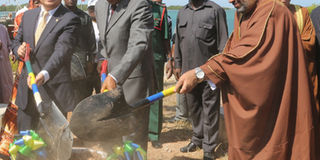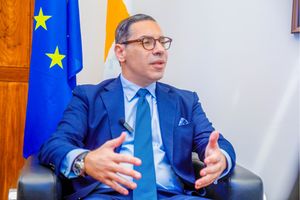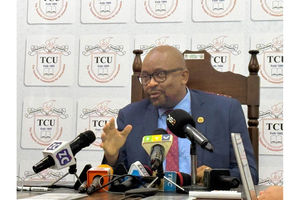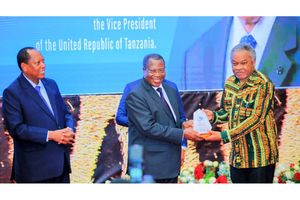Payout hitches delay logistics centre project

Former President, Mr Jakaya Kikwete, Minister for Transport and Communication from the Sultanate of Oman, Dr Ahmed Mohamed Al Furaisi (Right) and the general manager for China-based, China Merchants Group Dr Hu Jianhua (left) prepare concrete to signify the official launch of Mbegani Port in Bagamoyo. The project is part of the Bagamoyo Special Economic Zone which will see the port being supported by factories which will form the second phase of the Kurasini Project. PHOTO|FILE
What you need to know:
Earlier, the project was scheduled to start late last year after the government released the second portion of the budget to be compensated to the affected residents.
Dar es Salaam. Construction of a huge business centre that will offer a common entry point for imports from China, will now begin mid next year due to delays to compensate all of the Kurasini residents who will be affected by the scheme.
Earlier, the project was scheduled to start late last year after the government released the second portion of the budget to be compensated to the affected residents.
Some Sh53 billion was released in September 2014 while another Sh45 billion was released during the 2013/2014 financial year to bring the total amount spent on compensations to hundreds of people to be affected by the project to Sh98 billion.
But with delays in compensations, the amount skyrocketed and by June 2015, the estimates were that another Sh3 billion would be required as the last compensation portion while another Sh500 million would be required to clear the area before China brings its $400 million (about Sh860 billion on the prevailing exchange rate) for actual construction. The agreement was that Tanzania should cater for all the compensation requirements while China would fund the actual construction.
But according to the director of planning and development at the Export Processing Zones Authority (EPZA) Lamau Mpolo, the last compensation package plus clearing costs have now reached Sh3.75 billion which Tanzania must source before China comes in.
“We had expected to have received the final payment segment at the beginning of the financial year which would have finalised compensation payments for the 17 remaining people and other costs of demolition including securing the certificate of occupancy from the government,” he told BusinessWeek.
However, with the central government failing to issue the remaining amount, EPZA, which is entrusted with the task of overseeing the project, decided to seek the help of TIB Investment Bank for a possible government-guaranteed loan.
The two institutions (TIB and EPZA) went on to sign a Memorandum of Understanding (MoU) for a Sh3.75 billion loan but despite the bank’s readiness in making the money available to EPZA, the same has not yet been approved by the Ministry of Finance. “We are hoping they will approve the loan soon and enable us to complete the compensation,” he said. He was hopeful that once the loan gets approved, they will be able to complete the compensation process by February, 2016.
Talks about the project began when China expressed a desire to start trade hubs in four African countries during the Sino –African Cooperation meeting held in Cairo which was held in 2009.
Ultimately, Tanzania was chosen as a starting point for the project. Tanzania, East Africa’s second largest economy, has so far compensated about 1,020 Kurasini residents to pave the way for actual construction of a project that will include the construction of a modern trade hub on the 60.4 hectares at Kurasini.
The area will turn Tanzania into a hub of Chinese goods throughout the entire East and Central African region.
The project involves both the government of China which is represented by the Yiwu Pan – African International Investment Corporation and the government of Tanzania represented by EPZA who will jointly run the centre under a Public Private Partnership (PPP) model.



